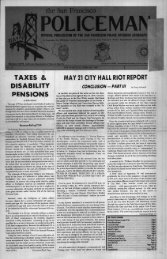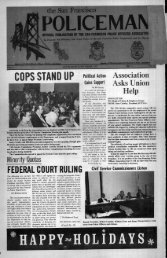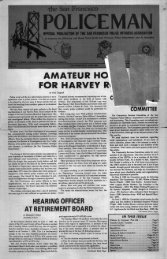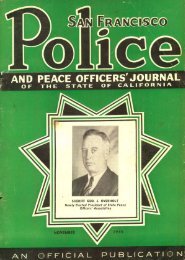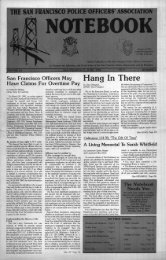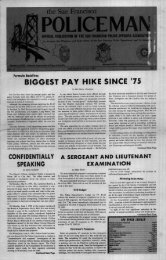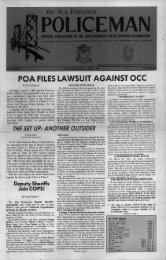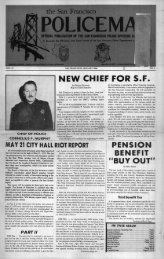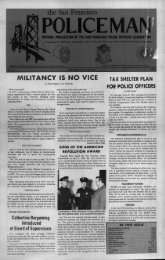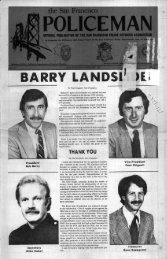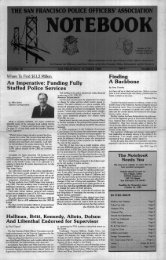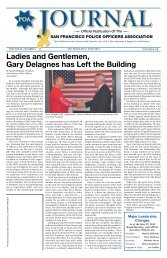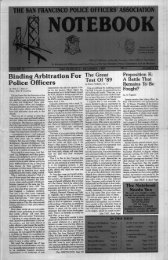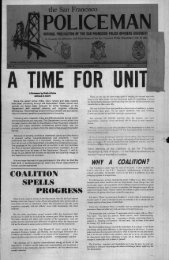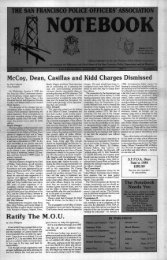June 1993 - San Francisco Police Officers Association
June 1993 - San Francisco Police Officers Association
June 1993 - San Francisco Police Officers Association
Create successful ePaper yourself
Turn your PDF publications into a flip-book with our unique Google optimized e-Paper software.
Page 4 Notebook <strong>June</strong> <strong>1993</strong><br />
-..<br />
RETIRED<br />
MEMBERS<br />
COLUMN<br />
by Gino Marionetti & Mike Sugrue<br />
Teacher and the Taught<br />
by Gino Manonetti<br />
t all started when someone had to be<br />
I picked for February's "Retired Members<br />
Column". Bill Osterloh's thirty-year<br />
SFPD career and after were unique. Beat<br />
cop, fraud inspector, police boss, science<br />
technologist, specialty planner, organizational<br />
authority, management analyst,<br />
press liaison, disaster technician, academy<br />
administrator, UC honors grad, Phi<br />
Beta Kappa, triple degree holder,<br />
credentialed teacher, faculty president,<br />
part-time dean, college teacher, professor<br />
emeritus, TV showman, public relations<br />
rep, Cal Berkeley researcher, social scientist,<br />
candidate examiner, perennial humorist,<br />
published writer - there seemed<br />
to be a lot of interesting things to say about<br />
a guy named "Bill".<br />
To start things off, I sent him the usual<br />
resume form. Two days later it was returned,<br />
blank. There was a kind of teacherstudent<br />
reprimand affixed. It was a clear<br />
"bawling out", the first of many more to<br />
come. "Gino, you're doing it all wrong'<br />
You aren't going to end up with anything<br />
alive when you start off with something as<br />
obituary-sounding as a personnel bureau<br />
rap sheet. When you find that real live<br />
person with a real live story to tell, you<br />
talk. Sit opposit your subject - a kitchen<br />
table is ideal - and start asking questions.<br />
You ask and ask, and then ask questions<br />
on the answers you get back. You pull<br />
teeth - big molars, and smaller laterals.<br />
Cops have the most glamorous jobs in the<br />
world, but they may not always realize<br />
this. So if you're looking for your story<br />
from a lifeless paper form, you are bound<br />
to come up with lifeless dullsville nothingness'<br />
"It may not be easy, Gino. That 'best<br />
cop in the country' - who unfortunately<br />
is working in the city - may be thought of<br />
as a great interviewer, but really is a<br />
horrible interviewee. However, don't forget<br />
your role. There is somebody out<br />
there who is going to read the Notebook.<br />
That reader will be looking for a story of<br />
interest. Your job: supply it'<br />
"Only minimal chitchat will lead to a<br />
realization that you have the wrong subject<br />
for your tale. This greatest-of-thegreat<br />
may be only an empty embodiment<br />
of steroetyped peer platitudes. If your<br />
subject turns out to be an unmitigated dud,<br />
look for someone lower in the popularity<br />
pecking order as a worthy second choice".<br />
Thus a demanding Bill-the-teacher and<br />
an overwhelmed Gino-the-taught began a<br />
true academic relationship. This joining of<br />
forces was going to extend beyond a<br />
single-column Notebook production. I<br />
know Bill Oster!oh was going to be a hardnosed<br />
bully in creating an artist. If Attila<br />
the Hun were still around, and in my<br />
shoes, he most certainly would point to<br />
craftsman Osterloh, and say in resignation,<br />
"From him! can learn". But while Bill<br />
insists that in a previous life he was gag<br />
writer for the old barbarian, it is well<br />
known that this showman is a big, nice<br />
clown at heart, and gentle pussycat in<br />
temperament. The many sessions in good<br />
writing that were in the making would be<br />
conducted by a stand-up comedian, who<br />
also is a hard-bitten expert in the written<br />
word. Yes, a onetime cop's classes for a<br />
onetime cop were going to be fun, as well<br />
as productive.<br />
So ol' teach' set up the process, and<br />
began with first things first. "For your<br />
sketch, Gino, initially you have to select an<br />
"attention grabber" . Do you remember<br />
that jazz about the one picture and the<br />
thousandwords? Askyour subject to come<br />
up with something significant from the<br />
family photo album. If all he has is that one<br />
snapshot returned by a lonely hearts group<br />
with a note reading, "We're not that<br />
lonely", you may have to seek out something<br />
else. But forget the current, where<br />
people's memories probably will envision<br />
the person. Get something from earlier<br />
times. If there was a cute wife posing<br />
alongside, great. Being the prettier, she<br />
will be better for 'attention grabbing' purposes".<br />
Only a week later, Bill was able to prove<br />
his argument well. The day after the Febmary<br />
release, an appelate court justice<br />
friend phoned him. "Great article, Bill.<br />
But if it hadn't been for that picture of you<br />
pulling a one-liner on Ronald Reagan, I<br />
might have missed it. And congrats, Bill.<br />
Who else can boast a picture of himself<br />
telling a joke to a U.S. president?" Yes, in<br />
the case of the Osterloh biography, an<br />
'attention grabber' was magnificently selected!<br />
Thus I began to write. Schoolmaster<br />
Osterloh demanded that there be several<br />
drafts before finalizing the project. Rewriting<br />
may be in order after only a paragraph<br />
or two, or perhaps after an entire<br />
preliminary draft had been completed.<br />
But don't make the mistake of the hack<br />
who believes his initial creation will fill the<br />
bill. My own effort would be tossed back<br />
mercilessly. "Do I really deserve another<br />
'F', Bill?" ('No, you don't deserve it, Gino.<br />
But there's nothing lower to give you.')<br />
But all abuse was swallowed patiently,<br />
because we join you, Attila, in affirming,<br />
"From him I can learn."<br />
While Bill and I met often before his life<br />
story went to print, we continued to meet<br />
afterwards with added freauency. His writing<br />
lab is what he refers to as "my classroom<br />
kitchen." He invariably would start<br />
the meeting with thoughts on the importance<br />
of word choice. Meaning is carried<br />
by something more than randomly selected<br />
words, he emphasized. Spelled out<br />
realism and attendant emotion are primary<br />
concerns in good writing. For example,<br />
the roast beef sandwich may be<br />
your favorite morsel. But will it still be if<br />
the menu before you in full technical<br />
exactitude calls it a "dead cow sandwich"?<br />
And on the subject of words, insisted my<br />
tutor, one should not shy from dictionary<br />
use. Here there might even be initial<br />
surprise in finding the words are arranged<br />
in alphabetical order, he needled. Similarly,<br />
a vocabulary is indispensable to the<br />
infrequent writer. And if it is not known<br />
what a vocabulary is, one is really needed.<br />
But there are two words my professor<br />
lavishly shouts during the lab sessions,<br />
"KISS" and "garbage." No, "KISS" doesn't<br />
relate to romantic fiction or a new soap<br />
opera script. In fact, "KISS" is neither<br />
noun or verb, nor even a word. It's an<br />
instructional abbreviation of great practical<br />
import, "Keep it simple, (clarity in<br />
composition) student!" It goes with that<br />
primary rule of clarity in composition,<br />
subscription to a well-ordered "who? what?<br />
when? how?" format. Accordingly, noting<br />
the time sequence involved, if you<br />
think it worthwhile to include that the<br />
retirees grandpappy would have discovered<br />
electricity, but was too poor to buy a<br />
kite, by all means get it in. But do so close<br />
Teacher and the taught<br />
to the biography's start, not after relating<br />
how junior won his diploma at the police<br />
academy.<br />
All of Bill's examples are graphic, He<br />
gives the application of "KISS" full dimension<br />
in telling how Mr. and Mrs. Rookie<br />
Cop got married in the retiree biography.<br />
He says the novice writer may lean to a<br />
poetic account of how the pair met. It may<br />
be put this way. "Upon first encounter, he<br />
saw through her enchanting beauty that<br />
this was the girl with whom he wanted to<br />
walk down life's highway. " Beautiful. But<br />
the reader might understand it to mean he<br />
had been looking for a hitchhiker instead<br />
of a wife. So to say they met today, he<br />
proposed tomorrow, and then married a<br />
week later should suffice in getting the<br />
story told. Once again, it's the reader who<br />
counts.Ifthatpersonwantspoetry, Byron<br />
or Keats will be sought out to satisfy the<br />
craving - not a Notebook columnist.<br />
In the same trend of concerns, there is<br />
what the Osterloh realism repeatedly classified<br />
as "garbage." He gives a graphic<br />
example while Mr. and Mrs. Rookie Cop<br />
are still on stage. The first child is born, not<br />
a particularly unique event. Now the wouldbe<br />
priest emerges from the writing cop.<br />
"A new life was bestowed from on high, a<br />
tiny gift of beauty from the heavens above,<br />
offered to the happy servants below etc.<br />
etc. etc." Bill, are you equating religious<br />
utterance with garbage? Miost certainly<br />
not. But the element of desecration lies in<br />
passing off garbage as religious utterance.<br />
The imagined role model priest most certainly<br />
would agree with the professor on<br />
the "garbage thesis" proposed.<br />
So how would you tell about the bouncing<br />
baby who now has come on the scene<br />
- whether boy or girl undetermined until<br />
it stops bouncing, of course? Easy. "It was<br />
a year later that a baby boy came along."<br />
As in the case of the poetry lover, if it's a<br />
sermon the reader wants, there will be a<br />
trek to church Sunday, rather than to a<br />
Notebook column.<br />
While engaged in "garbage talk," Pr.<br />
Osterloh goes on with another personal<br />
peeve, that trite, hackneyed, corny, overworked<br />
element of bad speech and bad<br />
writing - the cliche. For example, he<br />
zeroes in on the mixed social affair where<br />
the master of ceremonies customarily identifies<br />
the "lovely wife" of a male principal.<br />
Is there some felt need to differentiate<br />
between the "lovely" and "unlovely"<br />
among spouses? If so, should he not<br />
explain that the particular wife in question<br />
was at one time a Miss America, but there<br />
weren't many Americans around then?<br />
Otherwise, "lovely" seems to serve no<br />
purpose other than annoying the hater of<br />
cliches, and embarrasing the singled-out<br />
spouse.<br />
Similarly, there may be that high level<br />
police representative addressing the local<br />
service club, beating to death his favorite<br />
expression of greatest humility and duty<br />
performance, "the publicwhom we serve."<br />
Now what's wrong with that, Osterloh?<br />
Only that it might carry more impact of<br />
the genuine if quoting the private conversation<br />
of two cops, rather than being a<br />
possibly empty expression of public relalions<br />
poobah, of course.<br />
Then in lower echelons, there is that<br />
overworked phrase of the academy dass<br />
valedictorian, "We of the police profession."<br />
Something wrong with that too,<br />
Bill? Yes, because police work does not<br />
constitute a profession in the strict sense.<br />
It is a craft, and a fine one. Nevertheless,<br />
there most certainly may be true "professionals"<br />
in the craft, albeit in the lowest<br />
levels of the bureaucratic totem pole. At<br />
any rate, it was a very wise person who<br />
said in definitive and humorously contradictory<br />
commentary, "Avoid the cliche<br />
like the plague! " Adhere to Professor<br />
Osterlohl's combined KISS-garbage rule<br />
of better writing, "Keep it simple, student,<br />
and while you're doing it, garbage free."<br />
There is not enough Notebook space<br />
to quote an Osterloh tirade on bad grammar<br />
and punctuation. He insists on proper<br />
comma use, for example. Commas do not<br />
representjustdecorative writing, he shouts.<br />
They make reading easy for the reader<br />
through arranging thoughts in orderly<br />
packets. In bad writing they may be used<br />
badly, or not at all, leading to added<br />
obscurity. So when purchasing that dictionary<br />
you've never owned, pick up a short<br />
handbook on basic grammar rules too he<br />
suggests.<br />
Perhaps most important to the development<br />
of writing skills, a very analytical<br />
Bill goes on, is to do a lot of reading, and<br />
then a lot more. He feels that in this age<br />
of the tube, most reading is confined to<br />
bumper stickers and sweat shirts. Speed<br />
reading may not be a must, but there will<br />
be satisfaction in knowing you can read<br />
with faster movting lips. But fast or slow,<br />
learn to read, read, read, if you wish to<br />
write, write, write!<br />
In conclusion, the old master drives<br />
home a realization that the cop's job is a<br />
writing job. He admits he hasn't been<br />
reading official police reports on a regular<br />
basis for twenty-three years. But based<br />
upon deficiencies he recalls from his old<br />
cop working days, he can extrapolate that<br />
their quality today may not always display<br />
a quarter century of improvement. So<br />
while he has emphasized the off-job reasons<br />
for learning to write well in the police<br />
realm, there most certainly is a significant<br />
job related one,as well. -<br />
And there is a multiple reason for me,<br />
Gino-the-taught, to go back to school for<br />
Bill-the-teacher's provocative writing<br />
classes. They are not only practical, they<br />
are fun. I really don't want that lower<br />
grade upgraded to an "A" just yet. Otherwise<br />
I might graduate, and thus have to<br />
miss all of those laughs I get in BI 1<br />
Osterloh's kitchen classroom.



